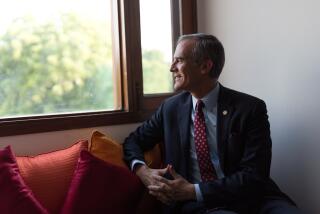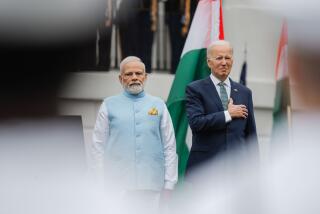U.S. Envoy Soothes India, Pakistan : Diplomacy: Strobe Talbott assures both nations that Clinton Administration desires improved relations. But reception to arms control suggestions is mixed.
- Share via
NEW DELHI — Historians record that one Pakistani prime minister visited New York just as the National League pennant-winning Giants, with Willie Mays in center field, blanked Cleveland in the 1954 World Series.
“This proves that the Indians are overrated,” Mohammed Ali quipped to his hosts in Manhattan.
Like baseball, the neighboring nations of India and Pakistan have traditionally seen their troubled relations, which have led to three wars, as having one winner and one loser.
What was good for Pakistan was bad for India, and vice versa.
Into those set and suspicious ways walked Deputy Secretary of State Strobe Talbott, who visited the countries this month to try to persuade them that the United States wants improved relations with both.
“We do not want a zero-sum game,” Talbott stressed in Pakistan. “When American officials come here in the future, we don’t want people in India thinking that it’s to the detriment of India’s national interest, and vice versa.”
The reception given to U.S. suggestions for arms control in the subcontinent was mixed and inconclusive. But on Talbott’s broader agenda--persuading India and Pakistan that the Clinton Administration had not forgotten about them--the bespectacled former journalist seems to have done well indeed.
“The visit cleared the atmosphere and got the countries back to substance,” said Pran Chopra, research professor at the Center for Policy Research, an Indian think tank. “He (Talbott) said things like, ‘I’ve come to consult,’ ‘I’ve come to ask,’ ‘An invitation has been extended,’ instead of it being presented, as it had till then, as a sort of summons.”
Pakistanis were pleased too.
“His coming was an important signal that South Asia is on the agenda of the Clinton Administration,” said a senior Foreign Ministry official close to the talks in Islamabad. “It was not just a non-proliferation trip that failed. Talbott wanted to say to us and the Indians that the zero-sum game was over in terms of relations with the U.S. He used the same words in both capitals: The zero-sum game is over. The U.S. wants equally strong and equally profitable relations with both Pakistan and India.”
When Indians, irritated by a series of what they believe to be provocative statements from Washington and the possibility of U.S. warplanes being delivered to Pakistan, suggested that the United States was resuming a pro-Pakistani “tilt,” Talbott rejected the notion.
“There is no American tilt toward any specific country in this region,” he emphasized at a news conference in New Delhi. “I’d suggest the very word tilt belongs to the past, and specifically, to the vocabulary of the Cold War.”
Observers in India and Pakistan said Talbott’s main success was in instilling or reviving good feelings about the Clinton Administration’s intentions, with any concrete achievements still in the future.
The No. 2 official in the State Department secured Prime Minister P.V. Narasimha Rao’s agreement in principle to visit the United States, and the Indians promised a speedy reply on the U.S. request to approve Defense Undersecretary Frank Wisner as ambassador-designate to New Delhi to fill a year-old vacancy.
As for the Pakistanis, they and the Americans issued a joint statement expressing shared commitment to “pursue the goal of capping, then reducing, and finally eliminating weapons of mass destruction and ballistic missiles in South Asia.” The Clinton Administration has proposed the release of 38 F-16s in return for a verifiable freeze on Pakistan’s nuclear program.
“There’s still a large area of disagreement, but both sides desire progress,” I.A. Rehman, chairman of the Pakistani Human Rights Commission, who met with Talbott, said afterward.
Indications were that U.S. diplomats in Islamabad were working hard to flesh out the proposals carried by Talbott.
“What they can be sure about is that we will not accept a unilateral arrangement,” one Pakistani Foreign Ministry official cautioned.
How to lure the Indians into accepting the same restrictions on their nuclear activities as Pakistan may be the rock on which the U.S. proposal founders.
In the past, Chopra said, India rejected a formula advanced by the United States for a five-nation disarmament conference to be attended by Pakistan, India, the United States, Russia and China.
India’s comments after Talbott’s departure showed that the Americans have their work cut out for them in transforming happier feelings into concrete decisions. Rao warned that allowing delivery of the nuclear-capable F-16s to Pakistan “can lead to an arms race in the region,” and he called any suggestion to restrict India’s nuclear options “unacceptable and unrealistic.”
The new U.S. proposal floated to the Indians, Chopra said, calls for a nine-member conference: the five permanent members of the U.N. Security Council plus Germany, Japan, India and Pakistan. One of India’s nettlesome questions is whether under such a formula, China would have to cap its nuclear program as well.
“Whether India will or won’t go to this meeting, and it probably will, it will ask for much more clarification,” Chopra said.
He believes that India may insist that three nuclear states created by the Soviet collapse--Ukraine, Kazakhstan and Belarus--also take part.
“Feathers have now been smoothed,” he said, summing up the results of Talbott’s visit. “But now we must see where this leads.”
More to Read
Sign up for Essential California
The most important California stories and recommendations in your inbox every morning.
You may occasionally receive promotional content from the Los Angeles Times.










